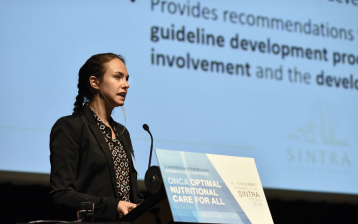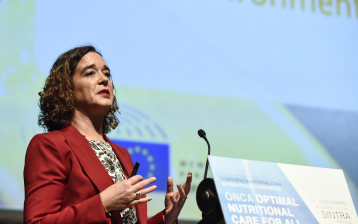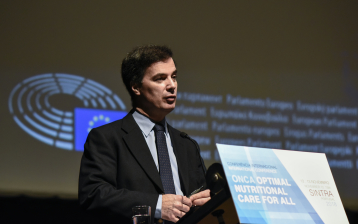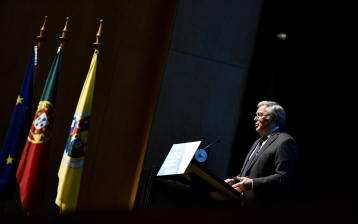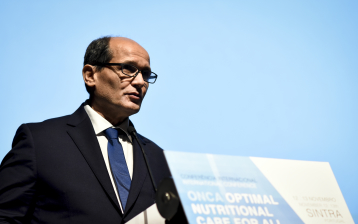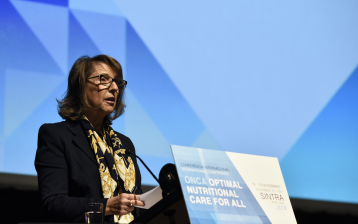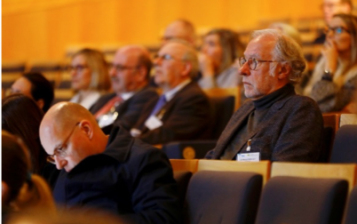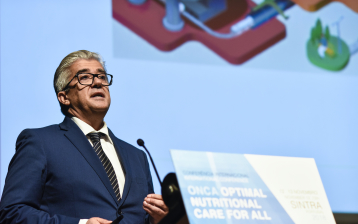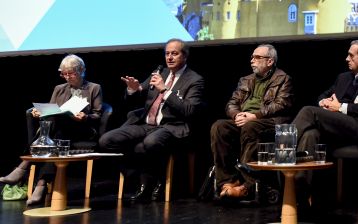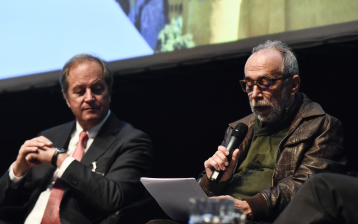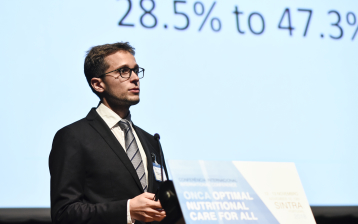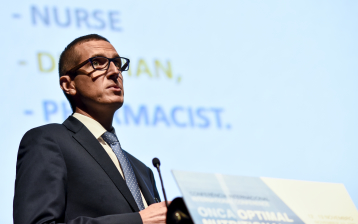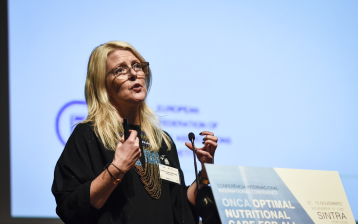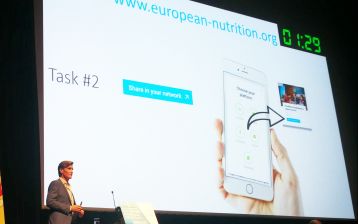ONCA
The Optimal Nutritional Care for All conference
A ONCA é uma Conferência internacional que reúne clínicos, nutricionistas, legisladores, políticos e grupos de defesa de doentes na partilha de conhecimento, no sentido de coordenar esforços para garantir o aporte nutricional ideal para todos.
15 Out 2019
Audiência Sintra
Audiência na Câmara de Sintra da APNEP com o Sr Presidente Dr. Basílio Horta como reconhecimento do todo o apoio da Câmara de Sintra ao projecto ONCA.
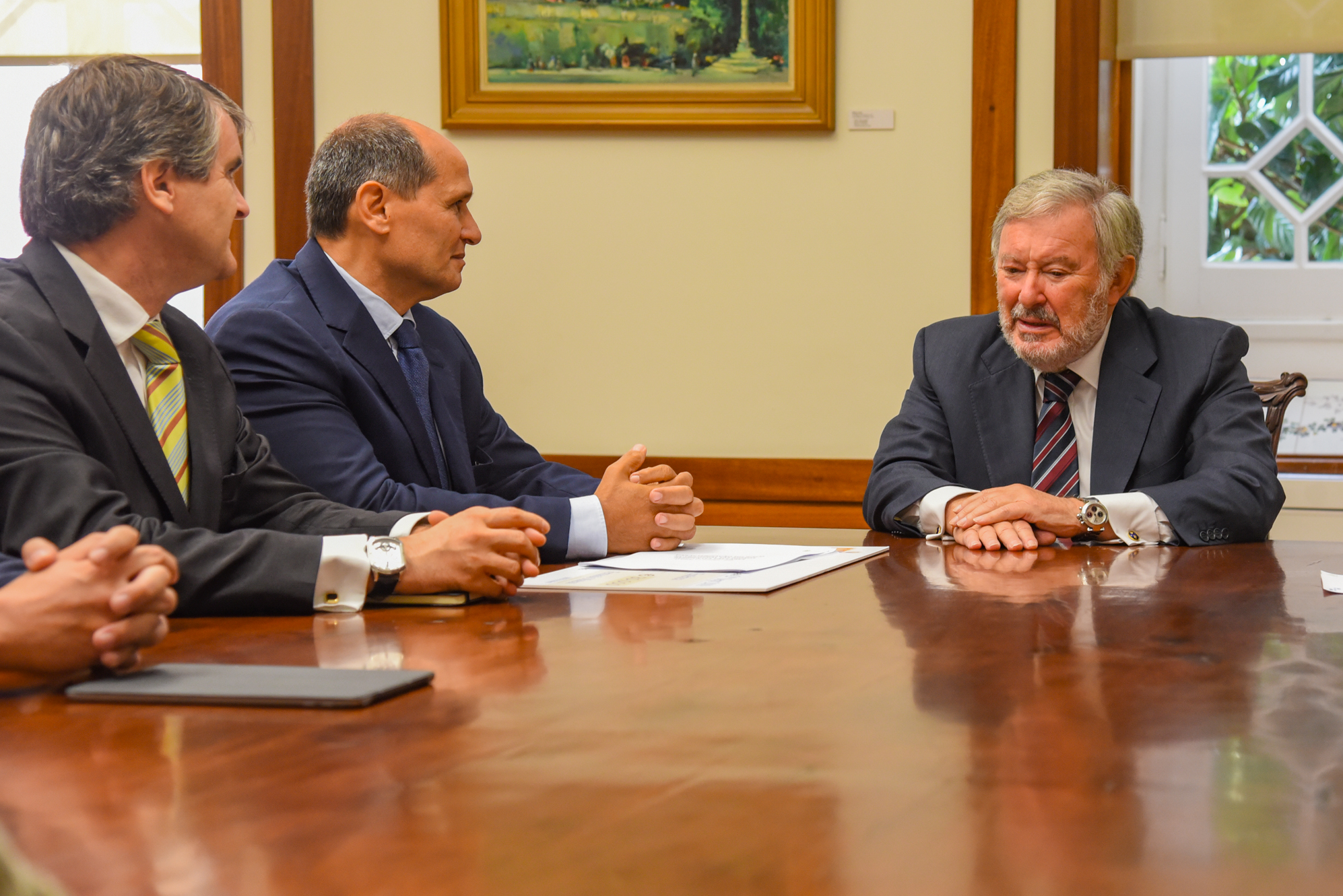
11
Palestrantes
02
Dias de Evento
18
Paises
213
Inscritos
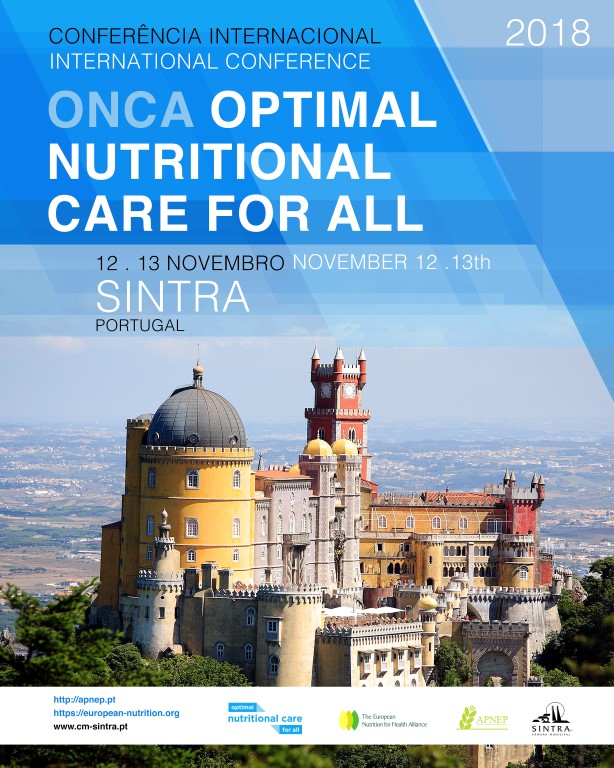
A conferência ONCA 2018 realizou-se em Sintra nos dias 12 e 13 de Novembro de 2018
As delegações de cada país membro da ONCA, incluindo representantes da indústria, reúnem e para dois dias de apresentações, workshops e discussão sobre tópicos que vão desde: influência nas políticas públicas, pesquisa colaborativa e conduta dos cuidados centrados na nutrição do paciente em ambiente hospitalar e domiciliário.
Conferência de 2018 teve lugar de 12 a 13 de novembro em Sintra, Portugal. A ONCA agradece o apoio oferecido pela delegação portuguesa, ao gabinete da Camara municipal de Sintra e ao Ministério da Saúde de Portugal.
ONCA
Organização Portuguesa
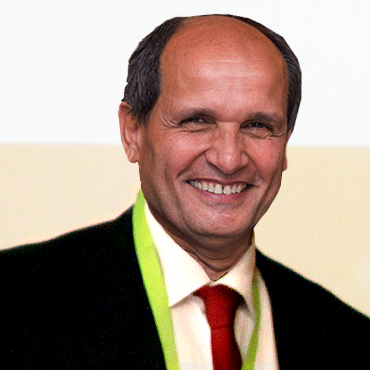
Aníbal Marinho
APNEP - Presidente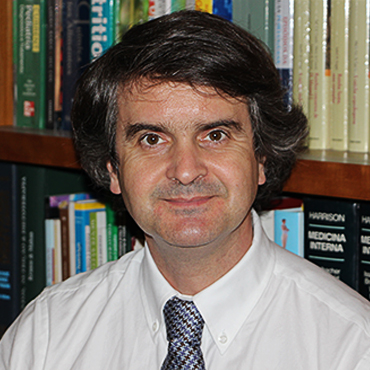
Lino Mendes
APNEP - Vice-presidente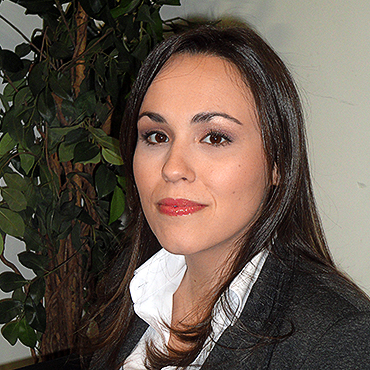
Célia Lopes
President General Assembly & Chairman Medical Nutrition Expert Committee ANIDONCA
Alguns dos palestrantes da Cerimonia de Abertura

Sintra
Portugal
Conference
Monday, 12 November 2018
The 5th annual Optimal Nutritional Care for All conference in Sintra, Portugal was opened by Anne de Looy, who welcomed delegates and Portuguese attendees of the opening ceremony. She described the vision of the campaign to create a world where every patient who is undernourished or prone to malnutrition is screened. Malnutrition is everyone’s business. The Optimal Nutritional Care for All campaign builds on and accelerates best practices. We have become very much a family of professionals coming together. Let’s be the generation that turns the vision into a reality.
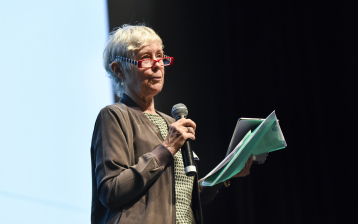

Anne de Looy, President of EFAD, ENHA Trustee
Malnutrition is everyone’s business. Let’s be the generation that turns the vision into a reality.
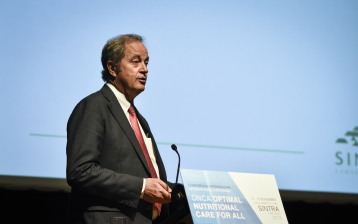
Olle Ljungqvist, Co-chair ENHA
In his presentation “Why the Optimal Nutritional Care campaign?”, Olle Ljungqvist highlighted the unique position of the campaign due to its great reach across 18 European member countries. Beyond its role as an international campaign, driven by policymakers and professional organisations, the campaign moreover provided the necessary depth by bridging the often-experienced gap between patients and healthcare providers, he argued, thus bringing all stakeholders across the nutritional care pathway together. Shared decision-making and meaningful patient involvement were key in improving nutritional care treatment and outcomes, he stated.
Ljungqvist argued that more access to nutritional care was needed across the patient base, as malnutrition formed a very important part of acute and chronic disease. Malnutrition and its consequences are highly costly for health systems across the European area. In order to effect lasting change, there was a need for data-driven research, he argued. Olle Ljungqvist reported on the ERAS project (Enhanced Results After Surgery) and highlighted the importance of training and audit in effective nutritional care provision and improvement.
Next, the audience heard from Katie Gallagher from the European Patients Forum (EPF) who pledged that it was a public policy priority to raise health literacy and awareness of the role of nutrition in the management of long-term conditions among patients and decisionmakers. In order to achieve this, Katie argued, it was vital to coordinate the patient perspective to meaningfully involve them in the process.
To this purpose, EPF are launching a paper in collaboration with ESPEN which provides lay versions of patient guidelines in accessible format to facilitate stronger patient involvement in nutritional care. In the creation of these guidelines, a great focus has been on patient input, in order to make the guidelines as accessible and adapted to the patients’ needs as possible.
Discussing the value of nutritional care for European citizens and EU support, Portuguese MEP Sofia Ribeiro underlined the role of the EU as a social actor, outlining the contributions the EU has made to nutritional care provision. Sofia Ribeiro argued that the EU was instrumental in aiding EU member states to achieve shared objectives in nutritional care and prevention standards. Moreover, the EU’s “from farm to fork” food safety policy provides a guaranteed baseline of nutritional standards throughout the European region. She highlighted the EU-wide School Fruit, Vegetable and Milk schemes to encourage healthier eating from a young age, as well as the New Alliance for Food Security and Nutrition, which seeks to introduce higher nutritional standards on an international level.
José Inácio Faria, Portuguese MEP and member of the EPP group on environment, public health and food safety, highlighted that effective nutritional care was paramount given the increase in comorbidities resulting from ageing population trends. In order to enhance physical activity, diets and health across the life course, the EU has implemented regulation to make nutritional information available on all packaging, whilst limiting the advertisement of unhealthy foods. While progress has been made, Faria argued that stricter measures needed to be in place to ensure better health outcomes.
"Healthy food should be made available and affordable for all."
Following the keynote addresses, Basílio Horta, mayor of the city of Sintra welcomed delegates to the conference. “The health and wellbeing of our citizens is the priority for Sintra government. We are looking to increase accessibility to healthcare – both primary and secondary, as well as ensuring better commitment to labelling in the food industry.”
"Sintra wants to assert itself as an inclusive and developed municipality in the region."
To this end, the mayor reported that the local government had negotiated for the construction of five new healthcare centres and a hospital, as well as for the development of a plenary health plan with the Ministry of Health. Basílio Horta welcomed the cooperation with the Optimal Nutritional Care for All campaign and APNEP (Portugese PEN Society) and was looking forward to the high-quality content of the conference to promote international cooperation in the campaign for optimal nutritional care for all.
ONCA Campaign in Portugal
Next, the audience welcomed by Aníbal Marinho, president of APNEP and chair of the Portuguese organising committee, who reported on the work of APNEP, one of the largest healthcare societies in Portugal with more than 2,000 conference participants each year. Aníbal thanked the Optimal Nutritional Care for All campaign for helping the organisation receive government backing for outpatient support and support of patient associations on a national level. He added that APNEP had been able to take advantage of the 2018 conference to optimise nutritional support for the local population by enabling nutritional screening, for adults and paediatrics, in all public hospitals.
Discussing nutritional care outcomes in Portugal, Céu Machado from the government health agency Infarmed discussed that despite growing awareness campaigns, obesity remained to be on the increase, “threatening a medical emergency”. Rates of obesity of 20- to 40-year-olds had doubled between 1992 and 2002, she stated.
Meanwhile, undernutrition was also rising, accounting for 35% of deaths of the under-40 population.
OECD data revealed that family spending on fruit and vegetables had significantly decreased during the last financial crisis. Malnutrition presents a real challenge, Machado argued, one which government should make a policy priority. “Health is the basis to the capacity to handle the physical and emotional challenges throughout everyday life”.
Paula Castelões, Royal College of Physicians, argued that "malnutrition is a current and pertinent matter for public health". In order to alleviate the problems associated with malnutrition, she pledged for the creation of more working groups to ensure quality care for patients.
Finally, António Sales, member of the Portuguese Parliament, argued for the importance of an integrated care model in Portugal.
"Today we live in a free, open Europe – a Europe which can be proud of its cultural diversity, its commitment to defining citizens’ rights and common values."
"If the EU wants to be a project that is fully alive again, it needs to demonstrate its ability to solve problems that are important to its citizens."
Due to its links to increases in morbidity and hospital stays, policymakers needed to act on undernutrition and malnutrition imminently, argued António Sales. Nutritional screening (both parenteral and enteral) should be available in every hospital, he concluded.
Following the lunch break, Olle Ljungqvist reflected on the high quality of speakers during the morning session. He expressed his delight at the fact that politicians and decisionmakers at all levels were sharing the same message, reflecting the goal of the Optimal Nutritional Care for All campaign to appeal to people across the care pathway to align their work to fulfil the vision of the campaign.
National challenges and development
Jorge Falcato, on the European Health Committee started off the next session, in which he discussed the presence of growing inequalities in the Portuguese healthcare system. "Almost 2 million treatments didn’t occur in the last year due to people’s inability to cover healthcare fees.”
“43.5% of elderly people in Portugal living in care homes are malnourished."
He argued that more needed to be done to combat the unequal health outcomes resulting from wealth discrepancies and malnutrition.
Ricardo Marinho further reported on the prevalence of malnutrition in Portugal. He presented his research findings from the Portuguese ANUMEDI study which revealed that 56% of patients were in moderate or suspected malnutrition with 17% severely malnourished. As such,
73% of all patients fell under the umbrella of malnourishment.
The research moreover strongly correlated malnutrition with illiteracy and recent hospital admissions. As such, he argued that socioeconomic factors were strong determinants of malnutrition, which were further exacerbated as a result of poor nutritional care.
Pathways to tackling malnutrition
Marek Lichota, representing the Polish patient organisation, discussed the importance of empowered patient involvement in nutritional care. He highlighted that the nutrition team not only consisted of physicians, nurses, dieticians and pharmacists but also the patient – a component far too often overlooked.
“Meaningful patient engagement is key”
To not only enhance the patient experience, but to contribute to the optimisation of care. In order to facilitate patient empowerment, the provision of the right information at the right time, health literacy, digital literacy and mutual respect to facilitate shared decision-making, were key.
He presented his initiative, “Appetite for Life” as an example of meaningful patient engagement and empowerment to showcase the benefits of an inclusive approach.
Next, delegates heard from Harriët Jager-Wittenaar, representing EFAD, who presented on good practices for effective nutritional screening and early malnutrition diagnosis. She argued that tackling malnutrition needed to be an interdisciplinary effort. Moreover, screening should not be the end goal, but rather the first step in the nutritional care process within a consistent feedback loop of evaluation. She also argued that in order to provide accessibility for all, malnutrition screening and assessment required validated, translated and cross-culturally adapted instruments. Screening and nutrition care should not only occur within the hospital setting. “The real window of opportunity for meaningful change is in the outpatient setting – before and after hospital admission”, she argued.
António Sousa Guerreiro pledged for the inclusion of clinical nutrition education in the curriculum of medical schools to allow for the greater integration of healthcare and nutritional care provision. He argued that
“it is mandatory to improve medical nutrition education for medicine students”
and that more should be done to overcome barriers to this.
Sharing good practices
Finally, Joost Wesseling, Campaign & Operations of the Optimal Nutritional Care for All campaign, presented on how to “build an audience”. He showcased the growth of the campaign and underlined the importance of spreading the campaign, not merely by discussing research findings within the campaign’s community but by making nutritional professionals, policymakers and members of the public aware of the importance of optimal nutritional care for all. He conducted an interactive micro-workshop to show delegates how easy it is to share a Good Practice with your peers. He appealed to delegates to make better use of these resources to allow the campaign to grow.


